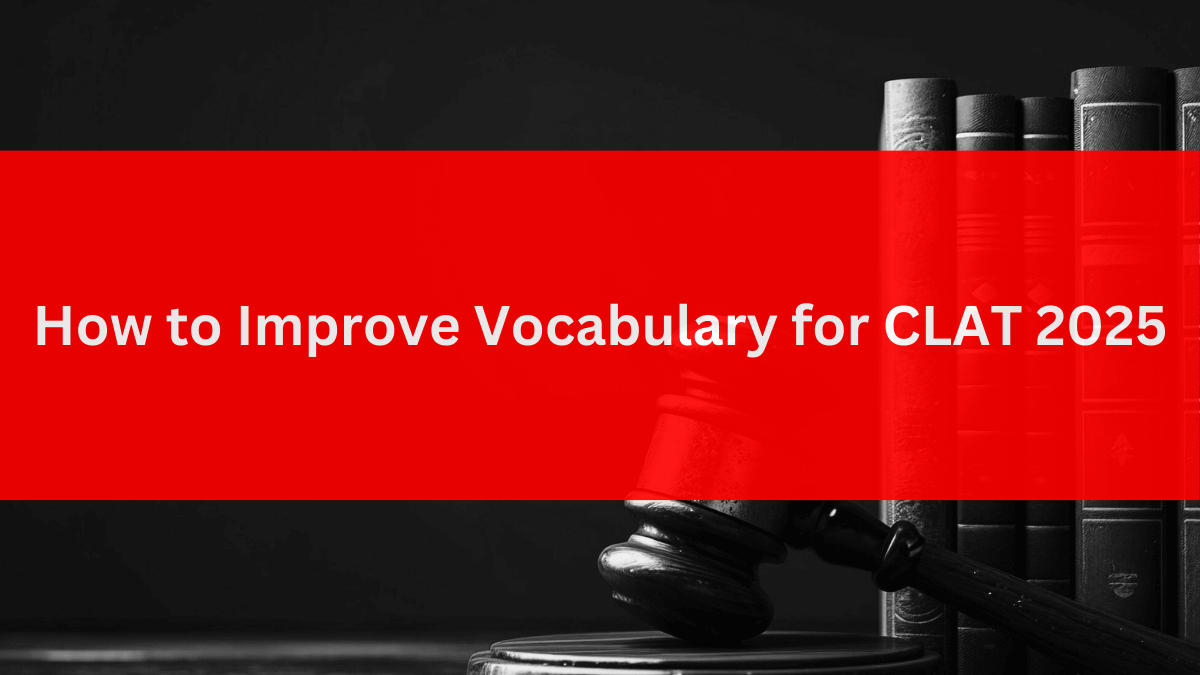How to Improve Vocabulary for CLAT 2025
Are you preparing yourself for the Common Law Admission Test (CLAT) 2025 exam and looking to enhance your vocabulary skills? Mastering vocabulary is critical if you’re pursuing the CLAT examination. It not only aids in effective communication but also enhances comprehension skills.

CLAT vocabulary often includes words related to law, legal principles, ordinary English, and logic. One of the best ways to strengthen your vocabulary is by delving into the world of root words. Students preparing for the CLAT must comprehend these terms and their meanings to perform well on the exam. And here’s a comprehensive guide to help you improve your vocabulary for CLAT 2025.
Get ready for the CLAT with our FREE Mock Tests guided by our experts
Understanding Root Words:
Root words serve as the foundational units from which numerous words are derived. They carry core meanings and often originate from Latin or Greek. By recognizing and understanding root words, you can decode the meanings of unfamiliar words, make connections between words, and expand your vocabulary.
Some common ‘root’ words in English include:
- act – to move or do (actor, acting, reenact)
- arbour – tree (arboreal, arboretum, arborist)
- crypt – to hide (apocryphal, cryptic, cryptography)
By recognizing these root words, you can break down complex words into their essential components and gain insights into their meanings.
Differentiating Root Words and Base Words:
Before going deeper, it’s important to distinguish between root words and base words. Root words form the core components of words, while base words, On the other hand, can stand alone and have their meaning, but they can also serve as the foundation for forming related words. Base words are more common in everyday language compared to root words.
Importance of Root Words in Vocabulary Building:
Root words serve as the cornerstone for expanding vocabulary. They facilitate word recognition, help connect words, and enable efficient vocabulary expansion. The root Word method to learn English Words is one of the crucial ways to build a strong vocabulary list.
It also assists in spelling the correct forms of any words. By recognizing common root words, you can deduce the spelling patterns and make informed guesses about the spelling of related words.
Strategies to Identify Root Words:
- Analyse Affixes: Break down words into prefixes, suffixes, and root words to identify the core meanings of words.
- Explore Word Families: Look for related words sharing common roots to enhance comprehension and retention.
- Consider Etymology: Understanding the origins of words meaning in recognizing root words.
- Analyse Word Structure: Pay attention to the internal structure of words to identify familiar root components.
- Consult Dictionaries: Use dictionaries to verify root words and gain more profound knowledge.
Effective Utilisation of Root Words:
- Recognising Root Words: Train yourself to identify root words in unfamiliar vocabulary encountered during CLAT 2025 preparation.
- Creating Word Lists: Maintain a personalized root word list to strengthen comprehension and retention.
- Exploring Word Families: Dive into related words derived from common root words to broaden your vocabulary scope.
- Contextual Learning: Understand root words in the context of sentences and passages to grasp nuanced meanings.
- Utilising Online Resources: Leverage online platforms offering root word databases and etymological insights for comprehensive learning.
Practical Applications of Root Words:
- Vocabulary Expansion: Mastering root words accelerates vocabulary growth and enhances language proficiency.
- Word Analysis: Break down complex words into root components for better comprehension.
- Medical Terminology: Understanding root words aids in deciphering medical terminology.
- Etymology: Explore the historical evolution of words through root analysis.
- Word Formation: Combine prefixes, suffixes, and root words to create and understand new vocabulary.
- Spelling and Pronunciation: Root word recognition improves spelling accuracy and pronunciation.
Common Root Words for CLAT 2025 Preparation:
Refer to the common root words and their meanings to enhance vocabulary.
| SR NO | Root word | Meaning | Words |
| 1. | Act | to do, to perform | action, react |
|
2. |
Aud | to hear | auditory, audience |
|
3. |
Bio | life | biology, biography |
|
4. |
Geo | earth, ground | geography, geology |
|
5. |
Chron | time | chronology, chronic |
|
6. |
Dict | to speak | dictate, contradict |
|
7. |
Dem | People | democracy, demographic |
| 8. | Fin | end, limit | final, infinite |
|
9. |
Graph | to write, to draw | graphic, autograph |
|
10. |
Hyper | excessive, beyond | hyperactive, hypersensitive |
|
11. |
Jur | law | jury, jurisdiction |
|
12. |
Meter / Metre | measure | thermometer, perimeter |
Tips for practicing CLAT vocabulary in 2025.
- Consistently reading:
Regularly read newspapers, magazines, and legal texts to encounter a variety of vocabulary. Practice previous years’ CLAT question papers to understand the pattern and types of vocabulary questions. Use vocabulary-building books and online resources tailored explicitly for CLAT preparation.
- Inclusion of Legal Jargon:
While the CLAT exam may include legal terminology, the focus primarily remains on general vocabulary. However, being familiar with legal terms can be advantageous.
- Recommended Study Resources:
Several study resources are available, including vocabulary books, online courses, and vocabulary apps explicitly designed for CLAT aspirants.
- Importance of Contextual Understanding:
Understanding the contextual usage of words is crucial as CLAT questions often assess the ability to comprehend and apply vocabulary in different contexts.
- Improving Vocabulary for CLAT:
Actively engage in reading materials related to law, politics, history, and literature.
Practice using newly learned words in sentences to reinforce retention. Participate in discussions and debates to apply vocabulary in real-life situations.
- Expectations of Synonyms and Antonyms:
Yes, the CLAT vocabulary section may include questions on synonyms and antonyms to test your understanding of word relationships.
- Time Allocation for Vocabulary Section:
Allocate sufficient time to practice vocabulary exercises and mock tests during your preparation schedule. Aim to spend around 15-20 minutes daily on vocabulary-building activities.
Sign up for IMS Get.Set.Law CLAT classroom 2025 program is designed to efficiently build your overall skills in all the CLAT domains to help you crack the NLU cutoffs and the personal interviews.






